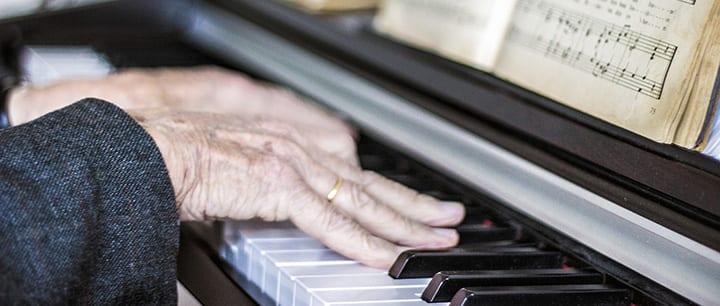“Every child is an artist. The problem is how to remain an artist once he grows up.” – Pablo Picasso
According to the 2008 NAMM Global Report on Music, 82% of adults who don’t play a musical instrument wish they did. It’s a funny thing for a musician like me to meet different people–a physician or an attorney, for example–and hear her say, “Gee, I always wished that I could do that.”
On November 11, 2013, the New York Times ran a story about some very interesting neuroscientific studies. One looked at the electrical activity in the part of the brain that processes sound and showed that adults who had taken music lessons as children and then stopped, as well as those who had continued to play an instrument for years, could produce the sounds of speech more quickly than those who had never taken lessons. The childhood lessons had kept some subjects’ brains sharp, and the adult lessons were, shall we say, re-sharpening others.
Certainly, there are many reasons you might choose to take adult beginner piano lessons. Some take them for a short time to prepare to perform at a special event, like an anniversary or a wedding. Others commit to taking piano lessons for the long haul. Few hobbies exist that are more fun in retirement, after we have our “empty nest,” or even while we have young children still at home.
On the other hand, plenty of grown-ups have excuses NOT to take them, despite their own interest or talent. As a teacher, I hear adults say things like “I’m just too stressed and busy to take up something else,” or “I tend to have pain in my joints,” or “I had a terrible experience as a young music student,” or “My memory is going.”
What’s funny is that these are perhaps some very good reasons TO take piano lessons. Keep reading to learn more.
6 Reasons to Take Piano Lessons as an Adult
1. Reduced stress levels Music (playing or making music, specifically) has been shown in multiple studies to trigger biochemical stress reducers and change the speed of brainwaves, so that they appear similar to those of one in a meditative state. And reduced stress levels often result in reduced contraction of chronic illnesses, especially heart disease, multiple sclerosis, and type II diabetes.
2. Improved joint health While it may not seem like a workout, any movement–including playing the piano–is key to staying flexible as an adult. Hands are trained to stretch in different directions, and the elbows move and stay loose constantly. This may very well fend off arthritis and general joint discomfort.
3. Better memory and neuroplasticity Better memory and greater neuroplasticity were revealed in studies of piano players and other instrumentalists from both the Chinese University in Hong Kong and Northwestern University. Neuroplasticity is defined by Northwestern researchers as “the brain’s ability to adapt and change as a result of training and experience over the course of a person’s life. These researchers concluded, after reviewing studies from all over the world, that “[a]n active engagement with musical sounds not only enhances neuroplasticity, but also creates permanent patterns important to all learning.”
4. Enhanced blood vessel function Scientists have found that the emotions patients experience while listening to “joyful” music have a healthy effect on blood vessel function. Music made study participants feel happier and resulted in increased blood flow in their blood vessels. That blood flow is one small key to fighting and preventing conditions like peripheral artery disease and atherosclerosis.
5. Elevated mood A study published in 2013 showed that music actually helped people get better in touch with their feelings and into a better mood. Self-awareness and mood regulation were cited by the participants as two of the most important benefits. Imagine the self-awareness that comes from active piano studies!
6. Self-fulfillment Lifelong learning helps lead us in our journeys to self-fulfillment, something that we all seek at one time or another. Piano lessons are a great way to stay active in and contribute to our communities. The decision to take piano lessons could end up being a catapult to a dozen social connections and a dozen opportunities to see ourselves succeed. You might think it’s too late to start, or restart, adult beginner piano lessons. But with a flexible teacher and an open-minded attitude, it’s never too late to see your dream come true.
 Heather L. teaches singing, piano, acting, and more in St. Augustine, FL. She is a graduate of the prestigious Westminster Choir College in Princeton, and has performed with the New York and Royal Philharmonics, and the internationally renowned opera star Andrea Bocelli. Learn more about Heather here!
Heather L. teaches singing, piano, acting, and more in St. Augustine, FL. She is a graduate of the prestigious Westminster Choir College in Princeton, and has performed with the New York and Royal Philharmonics, and the internationally renowned opera star Andrea Bocelli. Learn more about Heather here!Photo by Christiaan Triebert
Suzy S.
